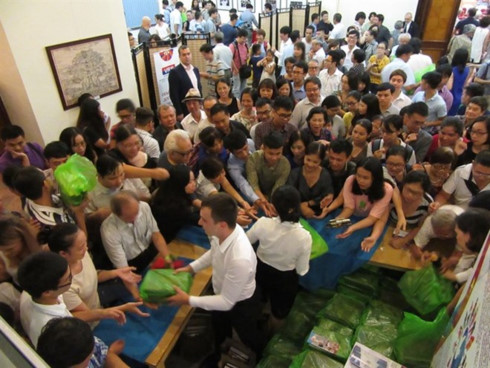


The publications
include Dau xanh tuoi tre (The raw youth) written by Fyodor Dostoyevsky;
and the comedy in verse Kho vi tri tue (Woe from wit) written
by Alexander Griboyedov, which satirises the society of
post-Napoleonic Moscow.
Additionally, two contemporary short story collections by several Russian
writers were also translated into Vietnamese. They are Kinh nghiem tinh
ai (Love experience) and Doi canh (Wings).
The publication of the books is part of a long-term project, which has been
jointly carried out since 2012, on translating literature from Russian into
Vietnamese and vice versa, under the patronage of Russia’s President Putin,
said Russian Ambassador to Vietnam Konstantin Vasilevich Vnukov at the book
launching ceremony last week.
The project has been carried out by the Russian Centre for Science and Culture
in Hanoi, the Vietnam-Russia Literature Fund and well-known Vietnamese
translators.
Translator Hoang Thuy Toan, director of the Vietnam-Russia Literature Fund
emphasised that Russian literature has had a great influence on shaping the
style of many Vietnamese writers.
"Russian culture has a lasting vitality in the hearts of the Vietnamese people.
I believe that the cooperation in culture and literature will be the basis for
the two countries to build and develop their partnership in many other fields,”
he said.
"Russian playwright and poet Griboyedov’s works have been taught at
universities in Vietnam for a very long time. The lessons have become easier
for our students as they can read some of his works in Vietnamese. Late
Vietnamese movie director Dinh Quang sang the praise of his comedy Woe
from wit many times and wished that one day this comedy would be staged in
Việt Nam. Now, there are many chances for his wish to become a reality,” he
said.
Nguyen Chien, one of the translators of the books, hoped that many other young
translators could help him and other older translators continue the translation
of good Russian work.
"I have been teaching Russian literature for over 30 years at Hanoi University,
and have translated hundreds of Russian works with my colleagues. I believe
that human cooperation is the basis for partners to build strong relations in
many other sectors. Russian literature has had strong influences in shaping the
style of many Vietnamese authors,” he said.-
Source: VOV
At the end of May, the Hoa Binh Provincial Ethnic Arts Troupe organized a series of performances for residents in Region 2 and Region 3 communes across the province. Bringing art to ethnic communities in remote, isolated, and especially disadvantaged areas has become a meaningful activity. These are not merely artistic performances but also journeys to disseminate cultural values, enrich spiritual life, and contribute to preserving the cultural identity of ethnic minorities.